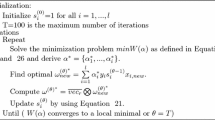Abstract
The Relevance Vector Machine is a bayesian method. This model represents its decision boundary using a subset of points from the training set, called relevance vectors. The training algorithm of that is time consuming. In this paper we propose a technique for initialize the training process using the points of an opposite map in classification problems. This solution approximate the relevance points of the solutions obtained by Support Vector Machines. In order to assess the performance of our proposal, we carried out experiments on well-known datasets against the original RVM and SVM. The GOM-RVM achieved accuracy equivalent or superior than to SVM and RVM with fewer relevance vectors.
Access this chapter
Tax calculation will be finalised at checkout
Purchases are for personal use only
Similar content being viewed by others
References
Bishop, C.M.: Pattern Recognition and Machine Learning. Springer, New York (2006)
Chaspari, T., Tsiartas, A., Tsilifis, P., Narayanan, S.S.: Markov chain Monte Carlo inference of parametric dictionaries for sparse Bayesian approximations. IEEE Trans. Sig. Process. 64(12), 3077–3092 (2016)
Demšar, J.: Statistical comparisons of classifiers over multiple data sets. J. Mach. Learn. Res. 7(Jan), 1–30 (2006)
Dias, M.L.D., Neto, A.R.R.: A Novel Simulated Annealing-Based Learning Algorithm for Training Support Vector Machines. Springer, Cham (2017). pp. 341–351
Faul, A.C., Tipping, M.E.: Analysis of sparse Bayesian learning. Adv. Neural Inf. Process. Syst. 1, 383–390 (2002)
Hearst, M.A., Dumais, S.T., Osuna, E., Platt, J., Scholkopf, B.: Support vector machines. IEEE Intell. Syst. Appl. 13(4), 18–28 (1998)
Hsieh, C.-J., Si, S., Dhillon, I.S.: A divide-and-conquer solver for kernel support vector machines. In: ICML, pp. 566–574 (2014)
Lichman, M.: UCI machine learning repository (2013)
Luo, J., Vong, C.M., Wong, P.K.: Sparse Bayesian extreme learning machine for multi-classification. IEEE Trans. Neural Netw. Learn. Syst. 25(4), 836–843 (2014)
MacKay, D.J.C.: Bayesian interpolation. Neural Comput. 4(3), 415–447 (1992)
Mackay, D.J.C.: The evidence framework applied to classification networks. Neural Comput. 4(5), 720–736 (1992)
Neto, A.R.R., Barreto, G.A.: Opposite maps: vector quantization algorithms for building reduced-set SVM and LSSVM classifiers. Neural Process. Lett. 37(1), 3–19 (2013)
Rasmussen, C.E.: Gaussian Processes for Machine Learning. MIT Press, Cambridge (2006)
Sun, B., Ng, W.W.Y., Chan, P.P.K.: Improved sparse LSSVMS based on the localized generalization error model. Int. J. Mach. Learn. Cybern. 8, 1–9 (2016)
Tipping, M.E.: Sparse Bayesian learning and the relevance vector machine. J. Mach. Learn. Res. 1(3), 211–244 (2001)
Tipping, M.E., Anita Faul, J.J., Thomson Avenue, J.J., Avenue, T.: Fast marginal likelihood maximisation for sparse Bayesian models. In: Proceedings of the Ninth International Workshop on Artificial Intelligence and Statistics, pp. 3–6 (2003)
Anqi, W., Park, M., Koyejo, O.O., Pillow, J.W.: Sparse Bayesian structure learning with “dependent relevance determination” priors. In: Ghahramani, Z., Welling, M., Cortes, C., Lawrence, N.D., Weinberger, K.Q. (eds.) Advances in Neural Information Processing Systems 27, pp. 1628–1636. Curran Associates Inc., Red Hook (2014)
Zhou, S.: Sparse lssvm in primal using cholesky factorization for large-scale problems. IEEE Trans. Neural Netw. Learn. Syst. 27(4), 783–795 (2016)
Author information
Authors and Affiliations
Corresponding author
Editor information
Editors and Affiliations
Rights and permissions
Copyright information
© 2017 Springer International Publishing AG
About this paper
Cite this paper
de Sousa, L.S., da Rocha Neto, A.R. (2017). Gaussian Opposite Maps for Reduced-Set Relevance Vector Machines. In: Rojas, I., Joya, G., Catala, A. (eds) Advances in Computational Intelligence. IWANN 2017. Lecture Notes in Computer Science(), vol 10305. Springer, Cham. https://doi.org/10.1007/978-3-319-59153-7_40
Download citation
DOI: https://doi.org/10.1007/978-3-319-59153-7_40
Published:
Publisher Name: Springer, Cham
Print ISBN: 978-3-319-59152-0
Online ISBN: 978-3-319-59153-7
eBook Packages: Computer ScienceComputer Science (R0)




